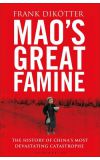
12 Jul 2011 04:13:28
Dikötter, a Dutch academic, accessed previously hidden archives to shine a light on China between 1958 and 1962, when millions of Chinese – he puts the figure at 45 million – were worked, starved or beaten to death as Mao attempted to overtake the west in less than 15 years. Ben Macintyre, historian, journalist and chair of the Samuel Johnson prize judges, called Mao's Great Famine the book of the year.
"This is not just an important book now, but it will become in some ways more important, as China becomes more powerful in the world and a greater part of global consciousness. To understand why China is the way it is, you almost have to read this book. If you want to understand why it's a materialistic, non-ideological place, you need to realise that just a generation ago, this appalling, manmade catastrophe was visited on its people," said Macintyre. "One of the judges, [biographer] Brenda Maddox, simply said 'this book changed my life - I think differently about the 20th century than I did before. Why didn't I know about this?' We feel we know who the villains of the 20th century are – Stalin and Hitler. But here, fully 50 years after the event, is something we did not know about. It's a testament to the power of non-fiction, that it can rock you back on your heels."
Mao's Great Famine, which beat five other shortlisted titles to win the prize, is "a vision of a society in utter collapse", said Macintyre, and Dikötter "ties it completely to Mao himself". "Often the famine is dismissed in the west as circumstantial, but Dikötter blows that myth completely out of the water. Mao and his cronies knew what was going on and just didn't care," said the writer, pointing to Mao's remark that "it is better to let half of the people die so that the other half can eat their fill."

